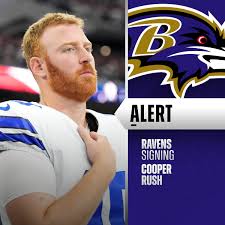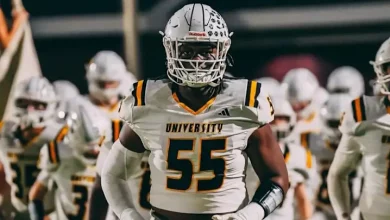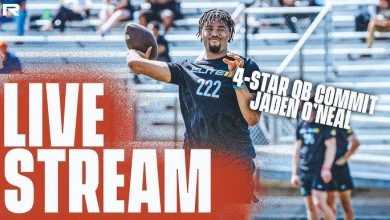Cooper Rush, previously a Cowboys backup QB, left for the Ravens after missing a $500k incentive in season finale.

The NFL is often a land of high stakes, immense pressure, and sudden twists, both on and off the field. In the case of Cooper Rush, the backup quarterback for the Dallas Cowboys, the 2024 season has been no exception. Rush’s story has been one of perseverance, opportunity, and, ultimately, an unexpected exit from the Cowboys after the final game of the regular season. His departure, coupled with the missed $500,000 incentive, has sparked debate and raised questions about the nature of professional sports contracts, team decisions, and the financial realities of life in the NFL.
Rush, who had been thrust into the starting role after Dak Prescott’s hamstring injury early in the season, had a solid and at times surprising run as the team’s leader under center. As the season progressed, his performance became increasingly vital to the Cowboys’ playoff aspirations. Rush, a relatively unheralded backup quarterback, took on the role of starter for a number of weeks, and his strong performance earned him not just the respect of his teammates but also a significant financial incentive. The terms of Rush’s contract included a $500,000 bonus if he played at least 55% of the team’s snaps during the season, a milestone that seemed within reach after Prescott’s injury.
However, in an unexpected turn of events, Cowboys owner Jerry Jones made the decision to start Trey Lance for the season finale against the Washington Commanders—a game that had little to no bearing on the Cowboys’ playoff position. For Rush, this meant that the incentive that had seemed so attainable was now out of his grasp. Rush, who had been playing well and had stepped up admirably during Prescott’s absence, watched from the sidelines as Lance took the reins for what many felt was an unnecessary start in a game that was largely inconsequential.
Rush’s absence from the game not only meant that he missed out on the $500,000 bonus but also signified the end of his time with the Cowboys. Just days after the game, it was reported that Rush would be leaving Dallas to sign with the Baltimore Ravens for the upcoming season. His departure, coming on the heels of the missed incentive, has sparked numerous discussions, not only about the financial side of the NFL but also about the way in which teams make decisions about player roles, contracts, and future opportunities.
In this article, we’ll dive deep into the story of Cooper Rush’s 2024 season, his incentive drama, his decision to leave Dallas, and the potential implications of his departure for both the Cowboys and the Ravens.
The Rise of Cooper Rush
Cooper Rush’s journey to the NFL was anything but typical. Undrafted in 2017 after a standout career at Central Michigan, Rush signed with the Dallas Cowboys as a free agent. Initially, Rush’s role was that of a practice squad player, with limited opportunities to prove himself. But as is often the case in the NFL, opportunities sometimes arise when least expected. In 2020, after a series of injuries to Cowboys quarterbacks, Rush was thrust into action and demonstrated that he was capable of handling the pressure. His performance as a backup quarterback earned him a spot on the Cowboys’ roster and made him a reliable option should Prescott ever go down with an injury.
However, it wasn’t until the 2024 season that Rush truly stepped into the limelight. When Dak Prescott went down with a hamstring injury early in the year, Rush was called upon to take over as the starter. He performed admirably in the role, leading the Cowboys through a stretch of games with strong passing performances and crucial victories. Rush’s poise and ability to manage games made him an unexpected asset for the team, and his steady play kept the Cowboys’ season alive while Prescott recovered.
Rush’s performance in the 2024 season also had significant financial implications. His contract included a $500,000 incentive for playing at least 55% of the snaps that season. With Prescott’s injury extending for several weeks, Rush was on track to meet that milestone and claim the bonus, which would have been a reward for his steady and composed performances in Prescott’s absence. Rush had earned the respect of his teammates, coaches, and fans for his ability to step into the starting role with little notice and lead the team effectively.
The Season Finale: Jerry Jones’ Decision and the $500K Missed Opportunity
The final game of the 2024 regular season against the Washington Commanders became a turning point in Rush’s career and financial situation. With the Cowboys’ playoff spot already secured, Jerry Jones and head coach Mike McCarthy made the decision to start Trey Lance, the former first-round pick who had been brought in as a backup for Prescott earlier in the season. The decision was puzzling for many, especially considering that Rush had been performing well and had been instrumental in keeping the team afloat during Prescott’s absence.
The choice to start Lance was seen by some as a way to evaluate his performance in a live-game situation, as he had only played in a limited number of snaps throughout the season. Given the fact that the game against the Commanders had no bearing on playoff positioning or seeding, it seemed like the perfect opportunity to give Lance a start and see what he could do in a real NFL game. But for Rush, this decision meant that he would not get the chance to play enough snaps to hit the 55% threshold required for his $500,000 incentive.
The decision didn’t sit well with many observers, especially given that Rush had done everything asked of him during Prescott’s injury. Fans, analysts, and even some of Rush’s teammates were vocal about their displeasure with the decision, feeling that Rush had earned the right to finish out the season and secure the financial reward that came with the incentive.
For Rush, the missed incentive was not just a financial blow—it symbolized the uncertain nature of the NFL and the business side of the sport. In an industry where players often have little control over their destiny, the decision to bench him for a meaningless game meant that Rush’s hard work and sacrifice during the season didn’t translate into the reward he had earned.
The Decision to Leave Dallas
After the season finale, it became clear that Rush’s time with the Cowboys was coming to an end. Despite his impressive performances and his role in helping the team during Prescott’s injury, it appeared that the Cowboys had made their decision about Rush’s future. With the arrival of Trey Lance and the continued presence of Prescott, Rush found himself on the outside looking in.
This led to Rush deciding to explore his options in free agency. In an unexpected twist, the Baltimore Ravens emerged as a potential suitor, offering Rush the opportunity to join their quarterback room and compete for the backup role behind Lamar Jackson. The Ravens, who had dealt with their own quarterback uncertainties in recent years, were looking for a reliable and experienced backup, and Rush fit the bill perfectly.
Rush’s departure from the Cowboys, while not a huge surprise given the team’s evolving quarterback situation, was nonetheless a tough pill to swallow for many fans who had seen him as a loyal and dependable contributor. For Rush, leaving Dallas was a chance to reset his career, join a new team, and potentially secure a more permanent backup role.
For the Cowboys, Rush’s departure marked the end of an era. After a season in which Rush had proven himself as a capable starter, his exit raised questions about the team’s plans at the quarterback position and their handling of the backup role. With the Cowboys committed to Prescott as their starting quarterback and Lance now in the mix, the team’s quarterback room had become more crowded than ever.
The Ravens’ Perspective: A Backup with Value
From the Ravens’ perspective, signing Cooper Rush made perfect sense. With Lamar Jackson firmly entrenched as the starting quarterback, the Ravens needed a reliable backup who could step in and manage the offense if Jackson were to miss time due to injury. While Trey Lance had potential, Rush’s experience in a starting role and his proven ability to lead an offense made him an ideal option.
Rush’s experience with the Cowboys in 2024 had shown that he was capable of stepping in and performing under pressure. His ability to lead the team to key victories while Prescott was sidelined was a testament to his maturity and composure in difficult situations. The Ravens likely saw this as a significant asset, especially in a league where backup quarterbacks often find themselves thrust into action unexpectedly.
Additionally, the Ravens’ decision to sign Rush reflects the growing importance of quarterback depth in today’s NFL. As teams continue to rely more heavily on their starting quarterbacks to lead the offense, the backup role has become more critical than ever. Rush’s ability to step in and win games, even in high-pressure situations, made him a valuable asset for a team that was looking to solidify its backup position.
The Future for Cooper Rush
As Rush moves on to the Ravens, the 2024 season will likely be remembered as a bittersweet chapter in his career. On one hand, Rush proved that he had the talent and composure to succeed as a starting quarterback in the NFL. On the other hand, his missed incentive, coupled with his departure from Dallas, highlighted the sometimes unforgiving nature of the business side of the sport.
For Rush, the future is uncertain, but it’s clear that he has the potential to make an impact wherever he plays. Whether he serves as a reliable backup or gets another chance to start, Rush has shown that he is more than just a footnote in the Cowboys’ history. His journey is a reminder of the volatility of the NFL and the importance of seizing every opportunity when it comes your way.
For the Ravens, signing Rush is a savvy move that strengthens their quarterback depth and provides a reliable safety net for Lamar Jackson. Rush’s experience, poise, and leadership will undoubtedly be valuable assets as the Ravens continue to build a team that is focused on Super Bowl contention.









